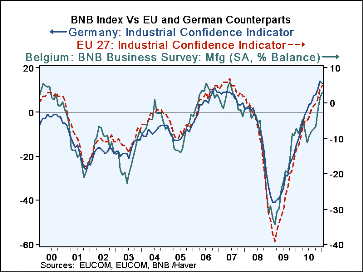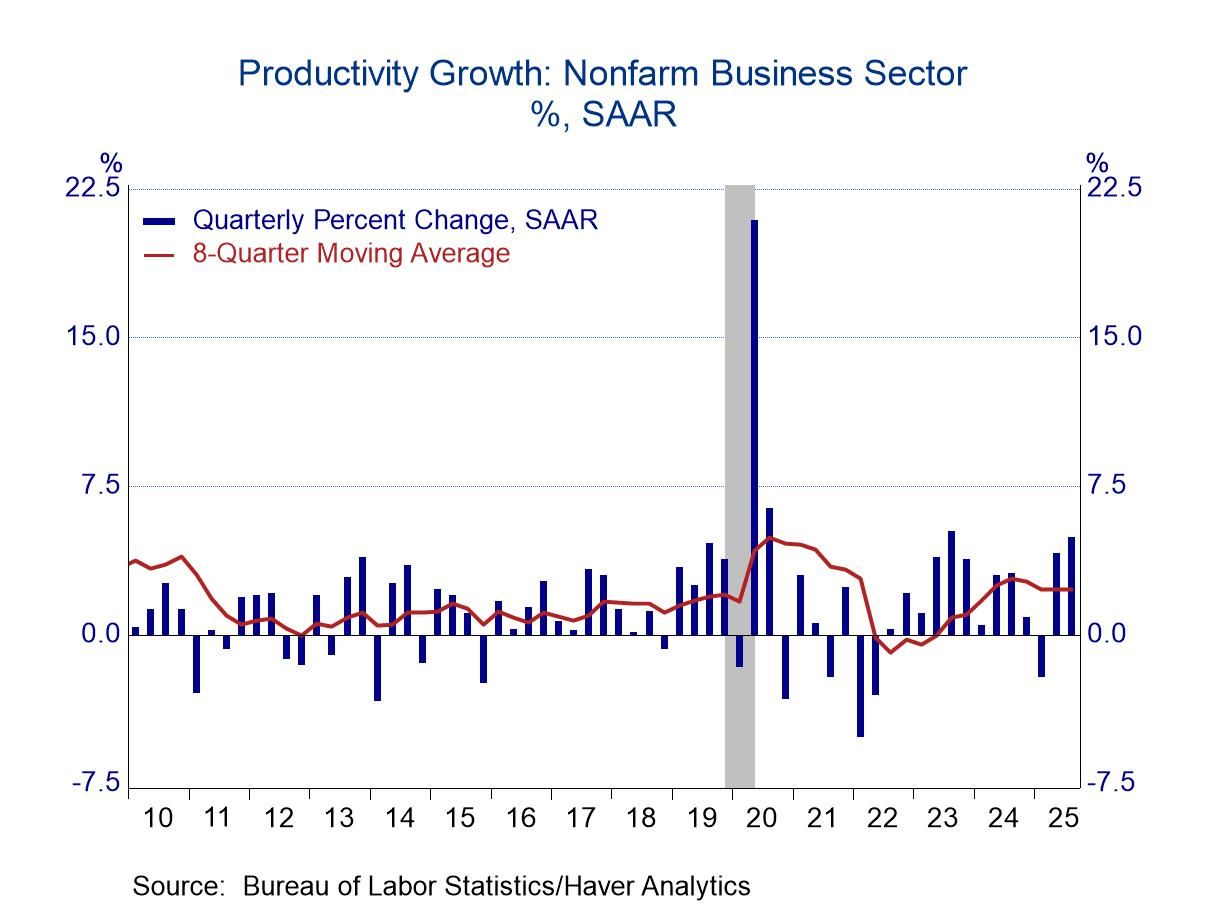 Global| Feb 22 2011
Global| Feb 22 2011Belgian National Bank Index Pushes Higher
Summary
The Belgian Bank Index is still pushing higher in February. It has in this recovery cycle crossed over into positive territory for the first time after flirting with the possibility in earlier months. The BNB index stands in the 82nd [...]
 The Belgian Bank Index is still pushing higher in February. It has in this recovery cycle crossed over into positive territory
for the first time after flirting with the possibility in earlier months.
The Belgian Bank Index is still pushing higher in February. It has in this recovery cycle crossed over into positive territory
for the first time after flirting with the possibility in earlier months.
The BNB index stands in the 82nd percentile of its ranked queue of values since 1990. This positioning means that the index has been stronger than its current value only about 18% of the time.
The prices portion of the survey indicates elevated prices over the last 12-months as they were assessed as in their 92nd queue percentile and, while they are still quite high in their 81st percentile, over the next 12-months, expectations are not for inflation to accelerate, at least on this measure.
The Belgian index puts unemployment in the 14th percentile of its queue which is a low reading, implying little fear of unemployment rising. This is interesting for a country of middle size in the Zone and one that has struggled to form a government.
The financial situation is appraised as ‘constructive’ on the current situation with a reading above the 50th percentile at the 66th percentile and with expectations for the next 12-months in the 63rd percentile; both of those surpass the sub-par reading of the 41st percentile over the last 12-months. So financial progress is in gear and is still a work in progress.
On balance the Belgian index is good news. As the accompanying chart shows the index tends to be a more volatile that the EU indices but it does tend to track them over the various cycles. Thus the increase in the Belgian index is pointing the way higher for the EMU indices in February. These indices are yet to be released and it’s good to have a reason to be positive as we await their release.
| Belgian National Bank Consumer Survey | |||||||
|---|---|---|---|---|---|---|---|
| Monthly readings | 3Mo Ago | 6Mo Ago | 12Mo Ago | % of Queue | |||
| Feb-11 | Jan-11 | Dec-10 | Since 1990 | ||||
| Consumer Confidence | 1 | -3 | -2 | 0 | -4 | -15 | 82.5% |
| Economic Situation | |||||||
| Next 12-Mos | 4 | -3 | 3 | 8 | 7 | -1 | 88.4% |
| Last 12-Mos | -10 | -21 | -17 | -12 | -15 | -38 | 83.3% |
| Price Trends | |||||||
| Next 12-Mos | 31 | 28 | 23 | 18 | 21 | 3 | 81.7% |
| Last 12-Mos | 58 | 55 | 52 | 55 | 46 | 25 | 92.0% |
| Unemployment Forecast | 8 | 15 | 16 | 17 | 27 | 64 | 14.7% |
| Major Household Purchases | |||||||
| Next 12-Mos | -19 | -20 | -20 | -20 | -16 | -26 | 25.5% |
| Favorable to buy at present? | 10 | 8 | 9 | 15 | 8 | 3 | 73.3% |
| Financial Situation of HH | |||||||
| Next 12-Mos | 3 | 0 | 0 | 2 | 1 | 0 | 63.7% |
| Last 12-Mos | -8 | -10 | -7 | -7 | -12 | -12 | 41.0% |
| Current situation appraisal | 20 | 18 | 19 | 21 | 17 | 19 | 66.1% |
| Household Savings | |||||||
| Next 12-Mos | 6 | 6 | 6 | 6 | 3 | 5 | 25.5% |
| Favorable to save at present? | -24 | -26 | -25 | -27 | -20 | -28 | #N/A |
Robert Brusca
AuthorMore in Author Profile »Robert A. Brusca is Chief Economist of Fact and Opinion Economics, a consulting firm he founded in Manhattan. He has been an economist on Wall Street for over 25 years. He has visited central banking and large institutional clients in over 30 countries in his career as an economist. Mr. Brusca was a Divisional Research Chief at the Federal Reserve Bank of NY (Chief of the International Financial markets Division), a Fed Watcher at Irving Trust and Chief Economist at Nikko Securities International. He is widely quoted and appears in various media. Mr. Brusca holds an MA and Ph.D. in economics from Michigan State University and a BA in Economics from the University of Michigan. His research pursues his strong interests in non aligned policy economics as well as international economics. FAO Economics’ research targets investors to assist them in making better investment decisions in stocks, bonds and in a variety of international assets. The company does not manage money and has no conflicts in giving economic advice.






